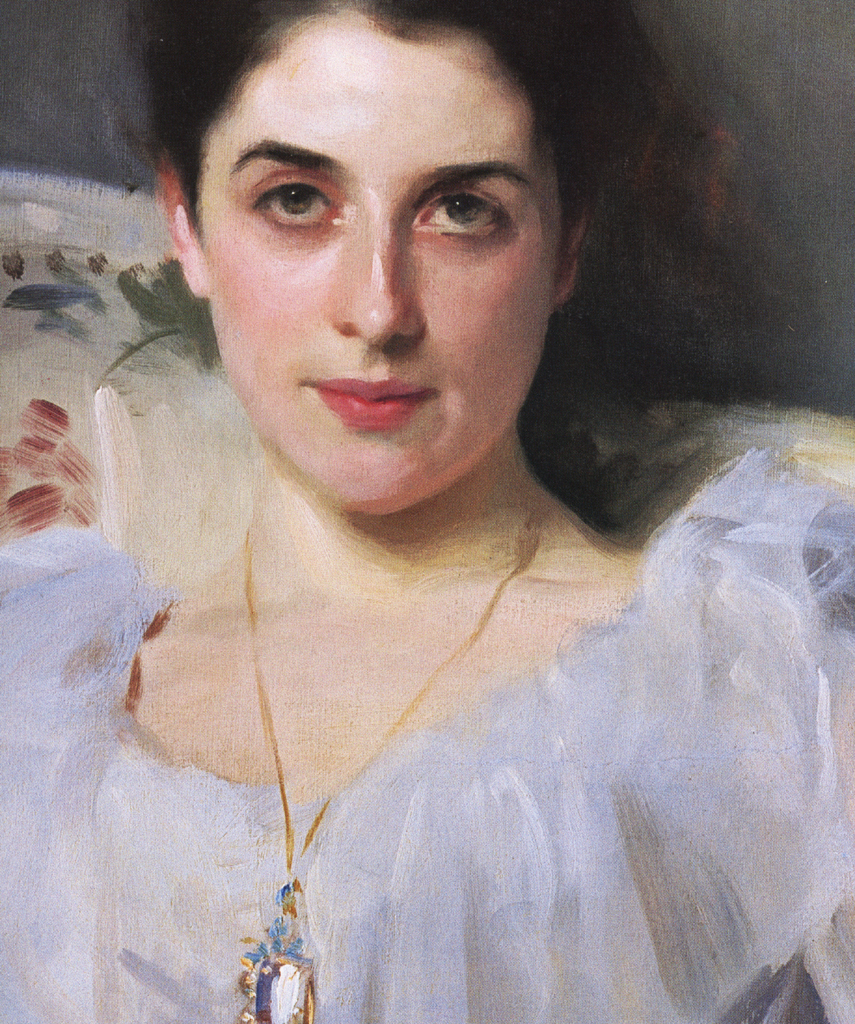Intro & Preface & Contents
Previous: Summer XXIV. Garden
For two things do my thoughts turn now and then to London. I should like to hear the long note of a master’s violin, or the faultless cadence of an exquisite voice, and I should like to see pictures. Music and painting have always meant much to me; here I can enjoy them only in memory.
Of course there is the discomfort of concert-hall and exhibition-rooms. My pleasure in the finest music would be greatly spoilt by having to sit amid a crowd, with some idiot audible on right hand or left, and the show of pictures would give me a headache in the first quarter of an hour... The truth is, I do not enjoy anything nowadays which I cannot enjoy alone. It sounds morose; I imagine the comment of good people if they overheard such a confession. Ought I, in truth, to be ashamed of it?
I always read the newspaper articles of exhibitions of pictures, and with most pleasure when the pictures are landscapes. The mere names of paintings often gladden me for a whole day -- those names which bring before the mind a bit of seashore, a riverside, a glimpse of moorland or of woods. However feeble his criticism, the journalist generally writes with appreciation of these subjects; his descriptions carry me away to all sorts of places which I shall never see again with the bodily eye, and I thank him for his unconscious magic. Much better this, after all, than really going to London and seeing the pictures themselves. They would not disappoint me: I love and honour even the least of English landscape painters; but I should try to see too many at once, and fall back into my old mood of tired grumbling at the conditions of modern life. For a year or two I have grumbled little -- all the better for me.
Alpha.
In general, I assume Ryecroft would be appalled by 21st century life. Most everything he despised about the end of the 19th century is worse now and in not a few cases things are worse in ways he couldn’t even have imagined (motorways, the roar of commercial jets over Kew Gardens, reality TV). But I’m fairly sure he would have appreciated a carefully curated iPod featuring his favorite music that he could listen to at any time -- I suspect most of my favorite fictional characters of the 19th century would agree that this is the best of the magical marvels we people of the future take for granted.
Perhaps viewing art -- at will -- on a giant screen at home would be similarly pleasing to Ryecroft, but I can’t say I am as confident about this. While I can’t think of a musical concert I’ve attended where I might not have experienced the music as well -- or often better -- at home, I can’t say the same thing about my experience with painting. Running into John Singer Sargent’s Lady Agnew of Lochnaw, ...
...(by surprise) in the National Gallery of Scotland remains one of the great moments of my art-appreciating life. Also, it is difficult if not impossible to reproduce the texture and richness of oil paint on even the best video display... or in a print, for that matter.
Perhaps the most interesting sentence here is the one where he confesses that he probably prefers reading the description of the painting to actually going to London and experiencing the art. Once again, the experience of enjoying art (like the memory of past good times) is seen to result less from the objective reality of paint on canvas (or time spent in some place doing some thing) and more on our subjective state at the time, or of factors, like a journalists words, that shape our subjective state.
If I had traveled to Edinburgh for the main purpose of seeing John Singer Sargent’s painting, would I have been so stunned by the experience of actually seeing it? He is my favorite painter of portraits and I always find his work pleasing, but it was the shock of the sudden encounter... going from mechanically wandering the halls, of a museum with not much art that appealed to me, (while killing time out of the rain waiting for a train) to being stopped in my tracks by the presence of his subject there on the wall before me. The genius of Sargent, in my layman’s opinion, is that you see, in addition to the person of his subjects, their very souls -- or at least you see the spirit Sargent wanted to see in them. Most of the portraits at a place like the National Gallery of Scotland could bear a caption something like, “Lady Pennywhistle, castrator of goats, cows, horses and several tenant farmers.” Under Sargent’s painting you wouldn’t be surprised to see, “Lady Agnew, a bit of a tease.”
Was it the music at your favorite concert or show that “made” that evening, or was it something else? It could well have been a combination of factors. Sometimes remarkable things happen in live performances that can’t be reproduced in a studio. But in general, a room full of random people (many of whom have been drinking) is not really the best bet for “hearing” music. But it might be the best bet for a total experience, that includes music, or, for which music is the catalyst.
I do wonder what Ryecroft would make of the current fad of authors touring and reading from their books. I’ve certainly enjoyed many of these events while at the same time finding them curious.
Next: Summer XXVI. Music.

No comments:
Post a Comment